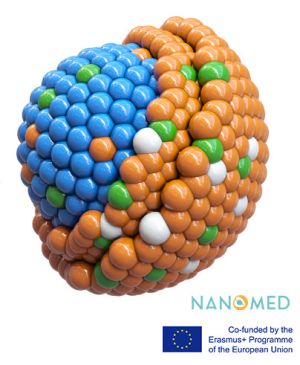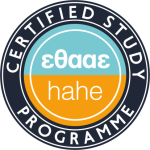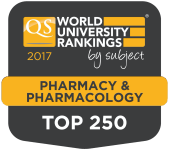Nanomedicines for Drug Delivery (NANOMED)
Nanomedicines for Drug Delivery (NANOMED)
The subject of this Postgraduate Program is the theoretical and practical education and training of young scientists in the design, production (in small and industrial scale) and evaluation (quality control, efficiency, and safety) of Nanomedicines afor Drug Delivery and other related applications, both theoretically and practically.
The aim of the program is:
- to cover research and training needs in the field of Nanomedicinal Drug products
- to develop research in this field and thereby promote new knowledge.
Graduates of the course will have the cognitive background to work inter alia at the related Pharmaceutical/biotech industry and at National and International regulatory bodies.
In addition, it is expected that the research link with the Academic and Industrial Partner Network of the NANOMED consortium will help to create and strengthen well-qualified and specialized human resources and additionally augment the transfer of know-how that will contribute to the promotion of the country's and Europe’s development needs, in the area of Nanomedicines.
NANOMED EMJMD students receive titles from all four participating Universities, together with a Document signed by all four Academic Coordinators. The possibility for a joint-Diploma is under consideration.
In University of Patras, the Postgraduate Studies Program “Nanomedicines for Drug Delivery" leads to the award of a Master of Science (MSc) Degree in
"Nanomedicines for Drug Delvery”.
Upon successful completion of the program, graduates will be able to know and master the following:
- the techniques and methodology for identifying and determining/calculating the required (for formulation) physicochemical properties of a drug, underlying the decision about the selection of the optimal type of formulation and optimal route of administration for a specific drug product
- the differences of drug formulation types according to physical state and administration route and the requirements for quality control of dosage forms; the techniques and methodologies for manufacturing of different types of Pharmaceutical Dosage forms and the basic requirements for ingredients and industrial settings for production of different types of dosage forms according to route of administration
- the concepts of acute releasing and prolonged/sustained release dosage forms and the kinetics regulating the design of controlled release dosage forms; methods to design and formulate such dosage forms
- approaches to evaluate the quality of dosage forms, according to regulatory rules
- advanced and novel methods applied in current days for formulation design and innovative techniques and methodologies applied for development of Pharmaceutical products; the strategy for experiment design and Quality by design
- the strategy and logic of applying Nanotechnology for formation of Nanoparticulate drug delivery systems/carriers, the specific requirements in terms of biocompatibility of Nanomedicines; the techniques and methodology for manufacturing of different types of Nanomedicines
- the differences between nanomedicine types and the requirements depending on the specific therapeutic or theragnostic or diagnostic application as well as the concept and strategies of drug Targeting (passive/active) by using nanomedicines
- methods to prepare nanomedicines, characterize them and evaluate their performance by in vitro methods
- The structure and properties of biological and biotech drugs (peptides, proteins, nucleic acids); structure and properties of antibodies, their production methods and how they are used in Pharmaceutics; basic concepts of immunology and vaccines; basic approaches to consider for preparation of a vaccine and for formulation of biological drugs
- to systematically review the scientific literature for a specific scientific question; critically assess publications
- the techniques of optimizing nanomedicines depending on therapeutic or diagnostic requirements, route of administration etc.; how a nanomedicine can go from the lab to the clinic and finally to the market, what to consider and how to organize each step
- Finally, they will be able to know the methods of industrial production of pharmaceutical/nanomedicine products and the Good Manufacturing Practice Practices, GMP), as described in the related European Harmonized Standard ISO’s , and EMA/FDA guidelines.
The tuition fees for participation in NANOMED EMJMD are 4500 €.
For more details visit:
Central NANOMED site at Coordination University: EMJMD NANOMED
Upon successful completion of the program, graduates will be able to know and master the following:
This 2-year, 120 ECTS Master’s Course in English offers a high quality and multidisciplinary education in the emerging field of Nanomedicine. The consortium is composed of four Universities: Paris (Fr, coordinator), Patras (Gr), Pavia (It) and Angers (Fr). Nanomedicine is a revolutionary interdisciplinary science, combining knowledge from Physics, Biology, Chemistry and Medicine to treat diseases of the human body. The NANOMED consortium has brought together the expertise of four Universities in their respective domains of Nanomedicine. Renowned experts in the field from academia and industry are involved in the pedagogical staff. The final goal is to achieve the qualification of young scientists with appropriate credentials to lead the related field, either in Industry or in Academia.
Upon graduation, each student will receive four Master’s degree diplomas corresponding to the National diplomas of the founding Universities.
Regarding the course content, the first semester (S1) taking place in Paris or Patras is dedicated to the “Introduction to pharmaceutical formulation” (Biopharmacy, formulation, production, controls). This first level provides the essential knowledge necessary to work in Pharmaceutical domains and to introduce innovative drug delivery system. Specific courses on chemistry or biology will be proposed to students with a scientific background who are non-pharmacist. At the end of S1, all students will follow practical courses in Paris.
The second semester will be dedicated to “Basic Nanomedicine and Biomolecules”. A 3-months traineeship carried out in selected laboratories will conclude S2.
The Advanced Nanomedicine part of the curriculum (S3) corresponds to the specialization of students by choosing a training option according to their professional project. In Pavia, S3 will be dedicated to the “Production and Specific Applications of Nanoparticles” providing students with in-depth knowledge on different applications of nanoparticles and production, regulations and quality by design. In Angers, “Strategy of Pharmaceutical Development and Non-Clinical Development of Nanomedicines” is training professionals to manage innovative research projects with skills in Nanomedicine transfer from research to pre-clinical applications. During the final traineeship period (S4, 6 months), students apply this new knowledge to the successful achievement of research and development projects on Nanomedicine carried out in academic or industrial laboratories. The curriculum will also allow NANOMED participants to attend one summer school and two workshops organized by the consortium.Application requirements will include the completion of a Bachelor’s degree in Pharmacy, or (under special provisions) in Chemistry, Biology, Biochemistry, Material Sciences or other adequate discipline. English language proficiency is also required.
- Université Paris Cité, France (Prof. Karine Andrieux, Dr. Caroline Roques)
- University of Patras, Greece (Prof. Sophia Antimisiaris)
- Pavia University, Italy (Prof. Carla Caramella, Dr. Christina Bonferoni)
- Angers University, France (Prof. Marie-Claire Venier, Dr. Emilie Roger)
Semester 1
Université Paris Cité [FR] - All students
Semester 3
Cycle of Specialized knowledge courses for Specialization Semester
Selection 1. Université d’Angers [FR]
Selection 2. Università degli studi di Pavia [IT]
Semester 2
University of Patras [GR] and 3-month internship in a Consortium University
-
HG4_NM7
Semester 4
In any of the 4 Partner Universities or Participating Institutions
-
HG4_NM12





